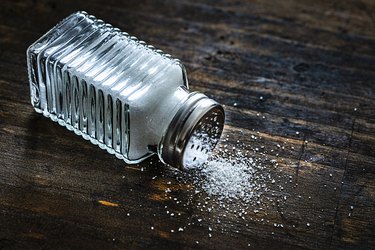
While you need some sodium and some cholesterol for your body to function properly, too much of either one can set you up for a wide range of heart issues. But is sodium related to cholesterol? Here's what you need to know.
Read more: What You Need to Know About Cholesterol
Video of the Day
Video of the Day
Jobs and Risks
Cholesterol is a waxy substance that your body needs to build healthy cells. Your liver makes all the cholesterol your body needs, notes Johns Hopkins Medicine, but you also get cholesterol from the foods you eat. The problems start when you have too much cholesterol in your system. Consuming too much saturated fat is one of several factors that can lead to fatty deposits in your arteries and an increased risk for heart disease, according to the Mayo Clinic.
When it comes to sodium, it takes just a small amount of the mineral to do its jobs — sending signals through your nerves, moving your muscles and maintaining the balance of other minerals and water in your body, according to the Harvard T.H. Chan School of Public Health. Problems start when you take in too much sodium, usually in the form of salt.
"Cholesterol and sodium increase heart disease risk in different ways," says Kevin Boblick, MD, an internal medicine physician specializing in cholesterol, hypertension and diabetes at the Loyola University Medical Center in Elmhurst, Illinois. "There were some old studies suggesting that a very-low-sodium diet might increase cholesterol and triglycerides, but these studies were not consistent or repeated. Most doctors would agree that sodium does not affect cholesterol."
How Much Sodium Is Too Much?
Harvard says that you only need about 500 milligrams of sodium to maintain essential body functions, but an average American consumes about 3,400 milligrams a day.
According to the American Heart Association (AHA), all that extra sodium in your blood can pull water into your blood and increase your blood volume. Over time, this can lead to high blood pressure, damage to blood vessels and more work for your heart. More than 70 percent of sodium in the average American diet comes from salt in packaged foods and restaurant foods, not your saltshaker, the AHA says.
Although people often develop high blood pressure in older age, eating less salt can help reduce the rise in blood pressure that comes with age. Lower blood pressure may reduce your risk of heart attack, stroke and heart failure, AHA states.
"The American Heart Association says that 3,500 milligrams of sodium is the safe limit for most people," Dr. Boblick says. "We recommend about 2,300 milligrams for most people. That's the amount in one teaspoon of salt."
"Most people do not need a lower salt diet unless they have heart disease or high blood pressure," he adds.
Potassium: The Connection to Sodium
The people at highest risk from a high-sodium diet are those who don't get enough potassium, according to Harvard. Potassium has the opposite effect on blood pressure and blood vessels than sodium, relaxing blood vessels, helping the body get rid of sodium and lowering blood pressure.
Having a high-sodium and low-potassium diet increases your risk for dying from a heart attack, and the worse the imbalance, the higher the risk.
"Healthy diets that will reduce your risk from sodium include the DASH diet and the Mediterranean diet," Dr. Boblick says. "These diets avoid processed foods and favor fresh and whole foods."
The worst offenders among processed foods, Harvard says, are those that use salt both to add flavor and act as a preservative: breads, pizza, sandwiches, cold cuts and preserved meats, canned soups and snacks like chips, cookies, crackers, pretzels and microwave popcorn. On the other hand, almost all unprocessed foods are low in sodium. Fruits and vegetables have the added plus of being naturally high in potassium.
Although sodium and cholesterol affect your heart differently, you can reduce both risk factors with the same heart-healthy diet.
Read more: Try a Plant-Based Diet to Reverse Atherosclerosis
- Johns Hopkins Medicine: "Cholesterol in the Blood"
- Harvard T.H. Chan School of Public Health: “Salt and Sodium”
- Mayo Clinic: “High Cholesterol”
- American Heart Association: “Get the Scoop on Sodium and Salt”
- Kevin Boblick, MD, internal medicine practitioner, Loyola University Medical Center, Elmhurst, Illinois
Is this an emergency? If you are experiencing serious medical symptoms, please see the National Library of Medicine’s list of signs you need emergency medical attention or call 911.